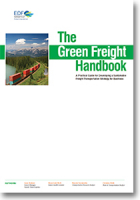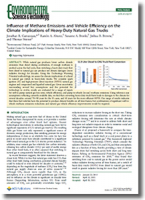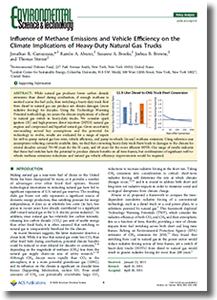Climate Impacts of Heavy Duty Natural Gas Trucks
Climate impacts of natural gas trucks depend on methane emissions across natural gas value chain and engine efficiency.
A paper co-authored by several EDF researchers published in the journal Environmental Science & Technology finds that while there are pathways for natural gas trucks to achieve climate benefits, reductions in potent heat-trapping methane emissions across the natural gas value chain are necessary, along with engine efficiency improvements.
If these steps are not taken, switching heavy-duty truck fleets from diesel to natural gas could actually increase warming for decades.
The research demonstrates a robust analytical framework to assess the potential climate impact of switching trucks to run on natural gas as today’s relatively small natural gas truck market expands. It finds that to achieve the potential climate benefits of natural gas trucks, it will be necessary to reduce methane emissions across the natural gas value chain and to improve the efficiency of natural gas trucks, which burn more fuel per mile than their diesel equivalents.
The study emphasizes the importance of reducing methane emissions both upstream (before the fuel reaches the vehicle) and in-use (at the vehicle level).
The findings have implications for truck and engine manufacturers, shippers, fleet operators and policy makers, many of whom look to the operational advantage in carbon dioxide emissions to justify the higher cost and reduced fuel efficiency of a natural gas truck.
This study is distinct and separate from the series of 16 methane field studies currently underway and does not use any data from those studies. However this study and the 16 methane field studies serve complementary purposes. All of these studies emphasize the importance of gathering more and better data on the magnitude of methane emissions across the value chain. Additionally, the paper published today provides a framework for understanding what climate impacts could be given new data points as they become available, such as those from the field studies.
Key findings of EDF’s study:
- The climate impacts of switching trucks to run on natural gas instead of diesel depends heavily on the magnitude of methane emissions across the value chain, as well as engine efficiency.
- Further research and improved data are needed to estimate with confidence the current climate footprint of natural gas trucks, in particular better understanding of methane loss along the natural gas well-to-wheels cycle.
- Using current and publicly available data, the study shows that a switch to natural gas would not produce climate benefits for several decades, but the range of results indicates that climate benefits could be realized if steps are taken to reduce methane emissions and improve engine efficiency.
- Burning natural gas as compared to diesel results in an approximate 30% climate benefit at combustion due to a reduction in carbon dioxide emissions, the advantage is closer to 20% once the fact that natural gas engines are less efficient is taken into account. And this is before accounting for methane emissions across the value chain.
- Several policy mechanisms are in play that could help improve the prospects of natural gas trucks producing climate benefits as compared to diesel, including recently announced federal upstream methane regulations and upcoming federal fuel efficiency and greenhouse gas standards for heavy trucks.
What’s Related



Favorites





